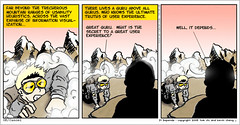If the process is simple and easy to follow, then there is a greater likelihood of success. Somewhat an adage but not completely understood by those in position to know.
A recent example of a process that does not "get it" is the bottle redemption process. Massachusetts is one of a number of states that charge extra for some containers at the time of purchase (beer, soda, and some other soft drinks... what is included and what is not could be the source of another posting). The surcharge is redeemable with the return of the container to an approved return handler.
Many of you probably deal with this so you know what a hassle it can be. My daughters used to take the returns back to the store for us to feed the machines and "earn" the pin money that the returns brought them. Alas, they are growing older and wiser and this money is not enough for the effort. Smart kids they are!
It is a hassle. You need to feed the container one at a time into the machine in a certain way for the bar code to be read, then the machine whirrs into action, crunching or shredding it, and dropping a coin or token or slip with your reward for this effort.
More than 30 people contacted the Globe last week after the newspaper reported that consumers returned and recovered their nickel deposits on 65.7 percent of the 2.2 billion bottles and cans purchased in the fiscal year ending June 30, the lowest percentage since the bottle deposit law took effect in 1983. ....
Wayne Campbell, who owns the Liquor Locker in Gloucester, said he would like to see the bottle deposit law abolished. ''It's filthy, unhealthy, and a very expensive way of recycling," he said.
Instead of using a deposit system, Campbell said, he would urge consumers to put their empties in the curbside recycling bin along with other materials that can be recycled. ''I think it would be a much more effective, cost efficient, and a more sanitary way of recycling," he said. Campbell said he used to process returns at his store by hand, but it was too messy and took up too much space. He now uses reverse vending machines, which he said many of his customers don't like. Tom Nield of Concord said there's little incentive to fix the bottle deposit system because the state pockets all the unredeemed deposits ($35 million last year) and retailers would just as soon see the law go away. ''The state doesn't want to make it easy for people to return the cans. They would rather keep the 5 percent tax," Nield said. ''The companies don't care how painful it is for the customers as long as it's easy for themselves." And there in lies the problem with obtaining a real solution to this mess.
- The state absorbs the unclaimed return funds. (Why should they change, the money clearly is easily obtained and used for "budget purposes" that would only require an increase in some tax somewhere to replace this source of funds?)
- The stores don't want to be involved in the return side. There is insufficient value in it for them. Providing a community service is not sufficient to the pennies that they get, hence the use of the machines.
The bottlers have little or no say in the matter. It is left to the consumers to organize in some way to gain attention to a resolution to this problem. Unfortunately, it is not very high on the priority listing.
What am I doing about it? (In addition to raising the issue here, that is.)
I am accumulating the returns and instead of waiting for girls to process them, I'll try and remember to bring it to the next bottle/can drive I see an organization hold for a fund raiser. It requires a little extra space in the garage but then allocates some funds to a worthy organization and reduces the money the state gets to keep.
What are you doing with your redemption eligible recycles?
Thanks to Bruce Mohl, Globe Staff writer for the article today!
| 










